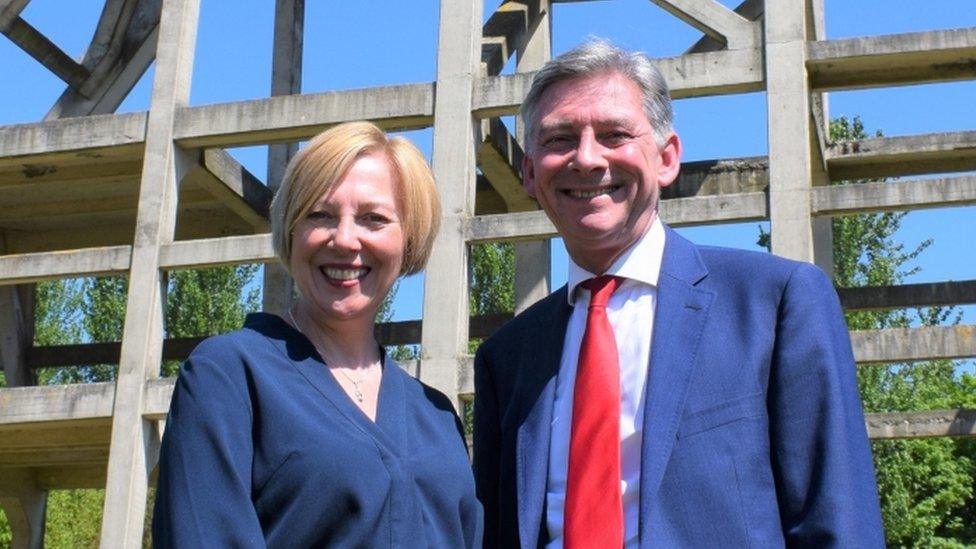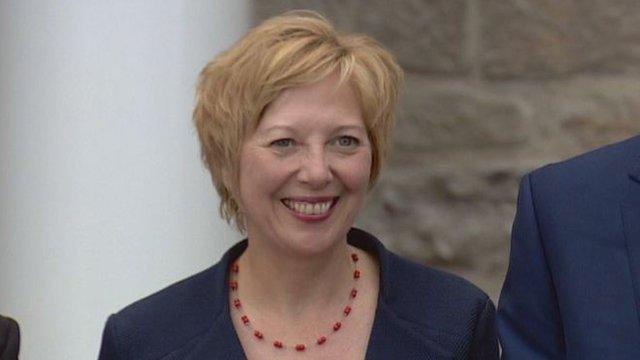Leonard: 'Give trade unions a central role in economy'
- Published

Richard Leonard was speaking at an event marking Lesley Laird's confirmation as his deputy
Trade unions should play a "central role" in Scotland's economy, according to Labour leader Richard Leonard.
In a speech in Glasgow, the MSP called for "modern forms of democratic planning in the economy" which tap into workers' expertise and experience.
Mr Leonard's speech was a response to the SNP's "growth commission" on the economics of an independent Scotland.
The SNP said Labour was "hopelessly consumed by chaos and conflicting positions on Brexit".
Scotland's parties have been setting out their own economic visions in the wake of the growth commission report, which also made policy recommendations for the current constitutional arrangement.
New forecasts from the Scottish Fiscal Commission have also suggested that the country is set for five years of "subdued" growth, with wages not due to rise in real terms until 2020.
'Economic planning'
Speaking at an event confirming Kirkcaldy and Cowdenbeath MP Lesley Laird as his deputy, Mr Leonard said there needed to be more forward planning in the economy, with an industrial strategy which does not just "lurch from one defensive rescue to the next".
He said: "We need democracy in our economy, not just when things go wrong, but to help things go right in the first place.
"Let me be clear about this: as far as the Labour party is concerned trade unions have a central role to play in the new economy, not just defending their members, but using their members' knowledge, skills and capacities to plan for the future.
"In our industrial strategy, we want to show people that through a new approach to long-term investment by unleashing innovation and the ingenuity of working people we can herald a renaissance in our manufacturing industries."

Constitutional questions over Brexit and independence have come to the fore in Scottish politics
The Scottish Labour leader also said "redrawing lines on a map" would not create a fairer Scotland, instead calling for "a rebalanced economy and a redistribution of wealth, power and opportunity".
He said: "We need to stop dividing people on the basis of nationality, and start uniting people on the basis of class to bring about real change."
This was echoed by Ms Laird in her speech. She said "constant debates about structure, process and the constitution have paralysed the Scottish economy", and added that it was "time for a different conversation".
A spokesman for the SNP said Labour talking about unity "would be laughable if it were not so serious", saying the party was "hopelessly consumed by chaos and conflicting positions on Brexit".
He added: "It is the SNP government in Scotland, and in opposition in Westminster, that is stepping up to the mark and working to protect the economy, jobs and the livelihoods of families across the country.
"The growth commission has opened up a lively and encouraging discussion over the path that Scotland can take.
"It offers a refreshed approach based on the importance of investment to stimulate Scotland's economy, an end to austerity and a plan for a progressive Scotland."
The Scottish Conservatives, meanwhile, contend that the UK government has been doing better work on the economy than the devolved administration at Holyrood.
Finance spokesman Murdo Fraser said: "The contrast between the UK government's progress and the dismal performance of the Scottish economy relative to that in the rest of the UK after 11 years of this Scottish government could not be more stark.
"Last year, our economy grew at half the rate of that in the rest of the UK, and more slowly than the economies of every single European Union country."
- Published29 May 2018
